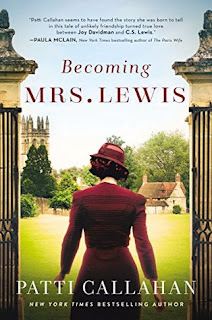Becoming Mrs Lewis by Patti Callahan
I saw this title on NetGalley and was interested as I'm one
of the many who grew up on the Narnia books, progressed to C.S.
Lewis's adult books and later enjoyed the film Shadowlands, about his
marriage to the poet and author Joyce Davidman.
What I hadn't realised when I requested the book was that this is a fictionalised
version of that story, though it makes much use of letters between the two from
their first correspondence - Davidman wrote to Lewis because his description of
his religious conversion struck an immediate chord with her. He replied, and a
lengthy and intimate exchange grew up between them. In many ways,
fictionalisation is a good choice for biography - it serves to remind us that
any account of another's life is necessarily a fiction, even when we have their
writing to base it on (come to that, it's the case even when they've written it
themselves). Initially though, it gave me some problems, because I found it
rather overwritten - later, I told myself that
Davidman (events are told in the first person, from her point of view) was,
as a poet, given to wielding words dramatically, so a degree of self-dramatisation
was appropriate.
I think the book's author, Patti Callahan,
admired both Davidman and Lewis fairly uncritically, so I found myself reading
between the lines quite a bit. Not with the sort of vilification that met
Davidman when she had the "effrontery", as many saw it, to marry
Lewis - they seem to me to have been a very successful couple, despite his
qualms about her divorced state, their relationship being a genuine marriage of
two minds - but I found Callahan's version of Joy quite hard to like, and I
think that might well hold true for the real person. But then, I find Lewis
quite hard to like too, if I'm honest - though the Inklings fascinate me and I
find them eminently readable, I don't think I would actually like any of them.
I suppose my biggest problem was with the account of
Davidman's first marriage, to fellow author William Gresham.
He certainly comes across as a pretty loathsome person, but I suspect that
during the time they spent together they would both have seemed, to me at
least, self-centred and histrionic, probably bringing out the worst in each
other. After her conversion to Christianity (she was Jewish, non-practising,
and had flirted with communism – a much greater sin in the US than here in the
UK), Davidman left her husband and two some for an extended research and
writing trip to to the UK, during which she planned to meet Lewis in person. I
can understand that she felt her writing was suffering at home, and that she
needed to write to earn, but still found it hard to reconcile the length
of time she was away from her children, particularly since there were already
signs – according to Callahan’s account, at least – that at least one of the
children feared their father, who had an explosive temper and was possibly a
suicide risk.
Readers who share the Lewises' religion will almost certainly enjoy this retelling of their relationship, while those who, like me, are interested in the Inklings will find much of interest, albeit secondhand. I imagine for many it will provide an impetus to go back to Lewis's own non-fiction and some may be inspired to further explore Davidman's poetry, which is oft-quoted, which didn't appeal to me. I did, however, find a previously unread author amongst Davidman's Oxford friends (unfortunately, long out-of-print and therefore almost unobtainable). I found myself sympathising again with C.S. Lewis's brother Warnie who, although much troubled, seems to have been a gentle individual, and enjoyed an American's impressions of the shabby shambles in which the Lewis brothers lived in peculiarly English fashion. At one point I had wondered whether to give up on the book altogether. I’m glad that I didn’t, because I did end up enjoying this rather poignant story. Thanks go to NetGalley for providing me with a review copy.



Comments
Post a Comment